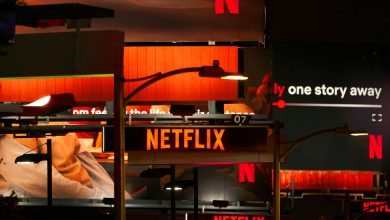Biden’s Vaccine Mandates Hit the High Court


Credit…Samuel Corum/Getty Images
Vaccine mandates get their day in court
Today, the Supreme Court will hear oral arguments over efforts to overturn two major Biden Administration policies designed to raise coronavirus vaccination rates: its vaccine-or-testing mandate aimed at large employers and a vaccination requirement for some health care workers.
The hearing comes as the country is facing a surge in Covid cases and the White House wrestles with how to manage this phase of the pandemic. It could be the “most important day for public health in a century,” according to Lawrence Gostin, a professor of global health law at Georgetown.
What’s the argument? It boils down to whether the federal government has the authority to impose these mandates, a question the Supreme Court has not yet considered in other challenges:
-
The Labor Department’s Occupational Safety and Health Administration says it has the power via a 1970 law that allows it to issue emergency rules for workplace safety.
-
Opponents, which include some states, trade groups and companies, say that the mandates should be left to legislation, not executive action.
Who is likely to win? It’s a tough call, according to labor lawyers. The court’s six-justice conservative majority may be skeptical of broad assertions of executive power, writes The Times’s Adam Liptak. The last time the Supreme Court considered a Biden administration policy addressing the pandemic — a moratorium on evictions — the justices shut it down.
-
A decision in favor of the mandate would mean that, by Jan. 10, large companies must have policies in place that require employees to be vaccinated or tested weekly. They must be following those policies by Feb. 9.
-
If the court rules against the government, then that would effectively be the end of the federal mandate, though the administration could pursue the regular rule-making process. This also wouldn’t preclude states from introducing their own vaccine requirements.
When will a decision be made? Today’s special hearing was called late last month, and the court said it would move quickly (as it did in a recent case over abortion rights in Texas). A ruling could come fast.
What have companies been doing in the meantime? Many have been gearing up for a mandate, if they haven’t already introduced such rules. Starbucks recently said that U.S. workers would have to be fully vaccinated by Feb. 9 or submit to weekly testing, in compliance with the mandate. JPMorgan Chase warned employees that “government-issued vaccine mandates may likely make it difficult or impossible for us to continue to employ unvaccinated employees,” and encouraged workers to get vaccinated. Macy’s requested the vaccination status of its employees, often a prelude to a mandate.
More pandemic news:
-
Six former Biden health advisers urged the White House to refocus on living with the coronavirus, not stamping it out.
-
Scientists warn that an endless series of Covid booster shots isn’t a viable public health strategy.
-
U.S. hospitals are running out of Covid treatments.
-
Germany will require people to show a negative test result before dining out.
HERE’S WHAT’S HAPPENING
Walmart halves paid leave for workers who test positive for Covid. The retailer will now give affected employees one week of paid leave instead of two through March 31. It’s the latest company to adopt updated C.D.C. guidance on isolation times.
U.S. mortgage rates climb to a two-year high. The average rate for a 30-year fixed-rate loan hit 3.22 percent last week, according to Freddie Mac. That raises borrowing costs for home buyers, as increasingly common bidding wars push up property prices.
A trade court rules that Google infringed on Sonos patents. The United States International Trade Commission blocked the tech giant from importing products that it said violated five Sonos patents. Google said it would appeal.
Rivian tumbles below its I.P.O. price. Shares in the electric vehicle maker fell sharply yesterday after one of its key customers, Amazon, agreed to buy delivery vans from the Chrysler parent Stellantis. Amazon’s move undercuts Rivian’s effort to rival Tesla in the electric-vehicle market.
Tim Cook gets a nearly $100 million payday. The Apple chief’s 2021 compensation was up more than 500 percent from the previous year. The huge bump was tied to Apple’s record profits last year — and came on his 10th anniversary as C.E.O.
The Times swings big
Here’s some M.&A. news close to home: The New York Times Company, DealBook’s publisher, announced yesterday that it was acquiring The Athletic, an online sports news outlet, for $550 million in cash.
The rationale: The deal would expand The Times’s reach within an important niche audience. The Athletic has 1.2 million subscribers, which when combined with The Times’s 8.4 million would quickly bring it closer to its goal of 10 million subscriptions by 2025. (There is a “relatively modest” overlap in subscribers, the company said.) The Times said it would offer The Athletic as a separate subscription, and will ultimately make it a part of a broader package. “The Athletic would add a large, and growing subscriber base to NYT’s expanding digital tentacles and could provide significant upside,” Douglas Arthur of Huber Research wrote to clients.
The numbers: The Athletic, which employs 450 journalists, generated about $65 million in revenue last year, but lost roughly $55 million. The Times expects The Athletic to eat into its own profitability over the next three years. “An alternative for the Times could have been to spend a fraction of this money to build a similar operation organically,” Kannan Venkateshwar of Barclays wrote. But David Perpich, a longtime Times executive who is set to become publisher of The Athletic, said, “If we were to have tried to build something, it would have been The Athletic.”
What about gambling? Last summer, there was speculation that betting platforms like FanDuel or DraftKings might acquire The Athletic. “We did not buy The Athletic to build a giant betting platform, but I don’t rule out that there will be ways that we work with gambling companies over time,” Meredith Kopit Levien, the C.E.O. of The Times, said.
“There were just so many falsehoods on that sheet of paper.”
— Susanna Stefanek, a juror in the trial of Elizabeth Holmes, on a 2014 document that said the blood testing start-up Theranos would produce tens of millions of dollars in revenue from drug companies, even though it had no contracts. Stefanek said the forecast was one of two “smoking guns” that led her and other jurors to convict Holmes of defrauding investors this week.
Unrest in Kazakhstan hits Bitcoin mining
Violent protests against the government in Kazakhstan this week led to intermittent internet shutdowns. The lack of connectivity disrupted huge cryptocurrency mining operations in the country, which has become one of the world’s largest hubs for this activity.
The disruption comes as crypto prices start the year under pressure, with Bitcoin down more than 10 percent since Jan. 1.
A crypto mining crackdown in China drove business to Kazakhstan. Creating Bitcoin and other cryptocurrencies, known as mining, is a power-hungry process in which vast computer networks compete online for newly made tokens. Last year, miners were forced to move from China, where the industry had flourished before a regulatory crackdown. Coal-rich Kazakhstan became a popular alternative.
A Guide to Cryptocurrency
A glossary. Cryptocurrencies have gone from a curiosity to a viable investment, making them almost impossible to ignore. If you are struggling with the terminology, let us help:
Bitcoin. A Bitcoin is a digital token that can be sent electronically from one user to another, anywhere in the world. Bitcoin is also the name of the payment network on which this form of digital currency is stored and moved.
Blockchain. A blockchain is a database maintained communally, that reliably stores digital information. The original blockchain was the database on which all Bitcoin transactions were stored, but non-currency-based companies and governments are also trying to use blockchain technology to store their data.
Cryptocurrencies. Since Bitcoin was first conceived in 2008, thousands of other virtual currencies, known as cryptocurrencies, have been developed. Among them are Ether, Dogecoin and Tether.
Coinbase. The first major cryptocurrency company to list its shares on a U.S. stock exchange, Coinbase is a platform that allows people and companies to buy and sell various digital currencies, including Bitcoin, for a transaction fee.
Crypto finance. The development of cryptocurrencies spawned a parallel universe of alternative financial services, known as Decentralized Finance, or DeFi, allowing crypto businesses to move into traditional banking territory, including lending and borrowing.
NFTs. A “nonfungible token,” or NFT, is an asset verified using blockchain technology, in which a network of computers records transactions and gives buyers proof of authenticity and ownership. NFTs make digital artworks unique, and therefore sellable.
The unrest raises the risks and costs of operating in the country. The Kazakh government, which at first welcomed crypto miners, was already growing wary of the activity, which taxed the country’s energy grid. The uprising this week began as protests over surging fuel prices.
Bitcoin processing activity plunged after Kazakhstan’s largest telecommunications company shut off internet access. The hashrate, a measure of the global computing power devoted to mine the cryptocurrency, fell more than 10 percent after the initial outage on Wednesday. Kazakhstan accounted for around 18 percent of the global hashrate in August 2021, according to the latest data compiled by the Cambridge Centre for Alternative Finance.
Where workers are beating inflation
This morning, the government will report how many jobs employers added to their payrolls in December. Economists expect the data to show a gain of about 440,000 jobs, a healthy number that would be a rebound from the previous month.
But increasingly there is a fear that low- and middle-income workers are not benefiting from the job market rebound. The reason: inflation. The strong economy is leading to a jump in prices, which means workers can buy less with their paychecks. That’s why trends in wages, which will also be reported this morning, are the numbers to watch.
Overall, salaries are not keeping up with inflation. For all private-sector workers, excluding managers and executives, pay was up just under 6 percent in November versus a year ago. That’s more than double the average annual wage gain of just 2.7 percent over the past decade. But that has lagged the overall increase in consumer prices of 6.8 percent. The result is an effective pay cut for the typical worker.
That might not last. “What I am banking on in the next year is for inflation to ease,” said Ellen Gaske of PGIM. “If wages in aggregate continue to lag inflation, that is going to erode people’s ability to continue to pay higher prices.”
Lower-wage workers are gaining more power. In recent decades, workers in finance and tech have been the biggest winners during economic upturns. That’s not what is happening now. Restaurants and hotels have raised salaries to restaff and retain workers as the economy reopens. Demand for warehouse workers and truckers has also jumped substantially, as more shopping shifts online. Tech and finance workers have seen the smallest pay raises in the past year, though they still make more on average.
“This is presumably exactly what Biden would want with his policies,” Dean Baker of the liberal-leaning Center for Economic and Policy Research told DealBook. “Those at the bottom are doing well, while those higher up are doing less well.”
THE SPEED READ
Deals
-
The musician John Legend sold his back catalog to BMG and the investment firm KKR. (Bloomberg)
-
A close look at Blackstone’s bet on two former Disney executives’ effort to create a new digital media empire. (The Information)
-
Britain’s rules governing SPACs are hurting London’s effort to compete with New York as a hub for blank-check funds. (FT)
-
GameStop is reportedly creating a division for NFTs as part of its turnaround plans. (WSJ)
Policy
-
Oregon officials said Nick Kristof, the former Times columnist, didn’t meet the state’s residency requirements to run for governor. (NYT)
-
A lawsuit blaming Facebook for the death of a security guard is challenging laws shielding social media platforms from liability over user content. (NYT)
-
France fined Meta and Google $240 million for making it too hard for users to refuse tracking cookies. (CNET)
Best of the rest
-
Cruise ships are still doing brisk business, despite criticism as coronavirus hot spots. (NYT)
-
“Larry Fink Wants to Save the World (and Make Money Doing It)” (WSJ)
-
That $1,000 bottle of Pappy Van Winkle bourbon is increasingly likely to be a fake. (NYT)
-
Broadway is so stricken by coronavirus infections that “Wicked” brought back an understudy who hadn’t performed in seven years. (CNN)
We’d like your feedback! Please email thoughts and suggestions to [email protected].



